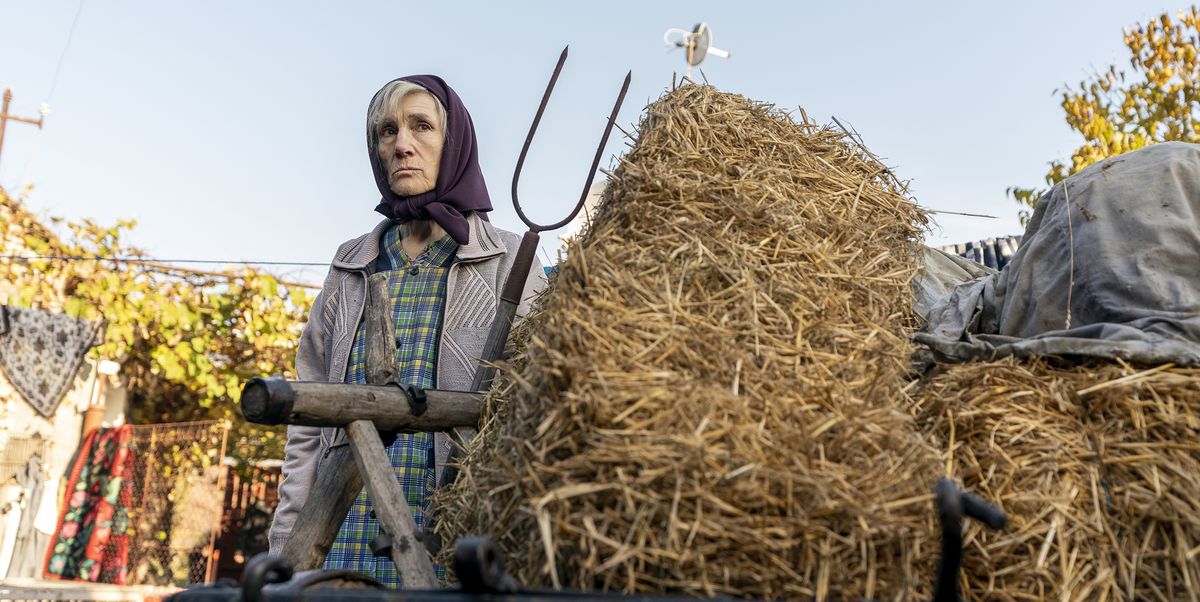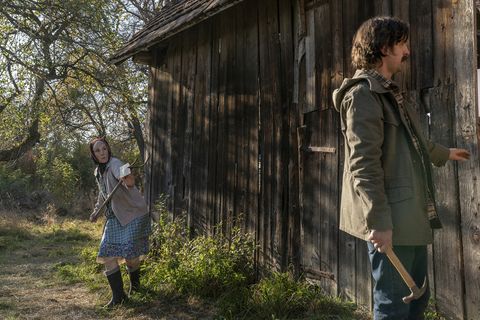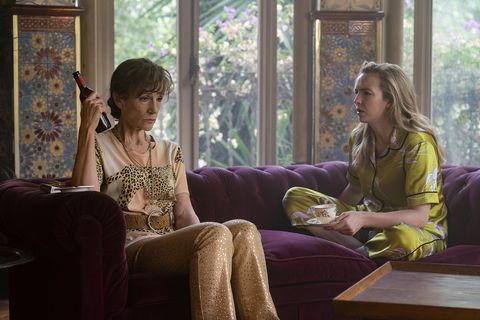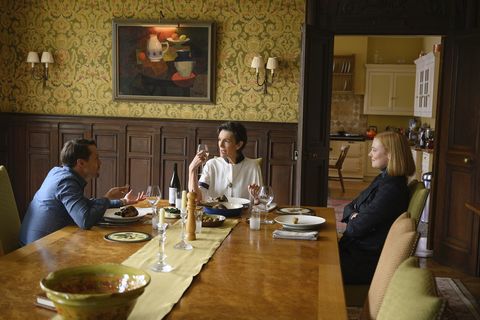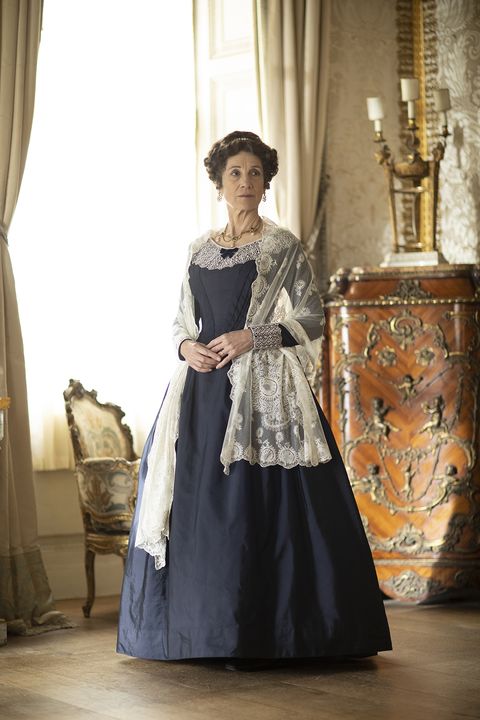Spoilers for Killing Eve season 3 episode 4, “Still Got It” below.
Harriet Walter has never killed anyone onscreen before. At least, not literally; as Succession‘s withholding mother Caroline Collingwood, she famously devastates her associates with an unexpected barb. (“I think I just got stabbed by your mom,” Tom (Matthew Macfadyen) tells Shiv (Sarah Snook) after an encounter with Caroline at their rehearsal dinner. “Oh yeah, that’s how it works,” she replies. “You’ll bleed out in about an hour.”) And Austen fanatics will remember Walter’s Fanny Dashwood nearly taking off Lucy Steele’s (Imogen Stubbs) head after she confesses her engagement to a Dashwood brother in Ang Lee’s 1995 masterpiece Sense and Sensibility.
But Walter didn’t get the chance to literally off someone until she took the role of Dasha, assassin Villanelle’s (Jodie Comer) eccentric trainer and mentor on Killing Eve. In this case, it was a pitchfork through the neck of Eve’s (Sandra Oh) rather grating husband Niko (Owen McDonnell) in the final moments of the latest episode. It’s a loss fans might celebrate as much as Eve mourns it—and we’ll likely be dealing with the aftermath of this moment for episodes to come. It doesn’t help that Dasha is trying to frame Villanelle for the murder, and thus, turn Eve against the woman she definitely probably loves.
But Dasha is no “icy bitch,” as Walter puts it. In fact, despite her career as an assassin, she’s possibly one of the actress’s most grounded onscreen characters. “I don’t usually play the naughty girl,” Walter says. “I thought it was imaginative casting.” She usually appears in a corset and a disapproving smile, like in EPIX’s Belgravia, the latest series from Downton Abbey creator Julian Fellowes. Walter plays Caroline, the Countess of Brockenhurst, who lost her son and only heir in the Battle of Quatre Bras in 1815. When a bastard grandson emerges 25 years later, Countess Caroline enacts a plan to ensure her wealth finds safety in his hands. But Walter notes there’s more to this character than a snide remark. “When I play aristocratic, aloof people, people think I’m being a bitch or nasty. I’m not,” she says. “I’m just playing somebody who is from a certain world and that’s how they behave.”
Walter is a stalwart of the London theater scene, and finds she gets more expansive parts—like Dasha—onstage. “I had done a range of rather anarchic, outside-of-me characters [on stage], and I think a lot of actors really enjoy escaping from themselves and playing somebody quite different,” she says. Below, Walter breaks down the Dasha’s motivations, finding the humanity in Lady Caroline, and exploring the Countess of Brockenhurst’s ulterior motives on Belgravia.
When did you first learn you’d be responsible for Niko’s death?
The scripts came as we went along, so we’d already shot quite a lot before I knew that, and I couldn’t build it into my knowledge while I was playing earlier scenes. That’s the way it works on a lot of these things—you don’t actually get the script until it’s late for you to put it back in anywhere else. But it was great to do. I’ve never had to kill anyone before.
It’s such a dramatic, Villanelle-esque death—you realize Dasha is where she gets her penchant for theatrics.
I’m glad you spotted that because that’s in my mind. I don’t even know if Jodie would agree with that. I just thought that myself privately. [Laughs]
How did they get you on board for Killing Eve?
A lot went on behind my back, I guess. I got to know about it when it was an outright offer. I think they might’ve originally been looking for a real Russian, then they started to look for actors who perhaps knew some Russian or could speak Russian. It’s pretty bad, my Russian, but at least I was in the age range and among the very few who could speak it in that age bracket. So great for me!
What made you decide to take the role?
It was no hesitation. I’d watched the show and thought it strikes this wonderful balance between character observation and absolutely out-there outrageousness. Watching Jodie and knowing that Jodie was the character I was supposed to have trained, I thought, I’ll be allowed to do strange accents and wear weird costumes and go on missions.
Was there a moment in the script that made the character click for you?
It’s not actually in the script but in the situation. There were moments when I was playing with Jodie where I got to the root of the reality of this very beautiful, brilliant agent at the beginning of her career. That made me feel Dasha’s longing for her own glorious youth when she was an Olympic star. That’s her vulnerability, really—she lives through Villanelle, but she’s also very jealous of her because she’s got it all ahead of her and doesn’t need Dasha as much as Dasha needs her.
Do you ever fear getting the tone right in the translation from page to screen? Like putting the baby in the garbage in episode 2.
There is that worry, but I knew the tone of this [show] is so outrageous and tongue in cheek. Compared to some of the horrible kills that Villanelle has done, and even Eve—Eve does some very eccentric stuff. There’s a sense that these women are uncontrollable people who might do anything. I love that aspect.
I have to imagine playing unhinged is very fun.
Absolutely. Everything is allowed. Even though I went a bit extreme on the accent, I find it very liberating to speak with a different voice. It unleashes something in me when I don’t hear my usual self. I get into a whole body language that is not me. To escape yourself is very liberating.
Is there a certain body language you associate with Dasha?
We had a scene which actually had to be cut, of me walking along the road and I had to develop a Dasha walk. The nearest I could do was [like] she’s walking into the Olympic stadium. It turned out a bit like a ballet dancer when you see them in the street—I tried to keep my back erect all the time. And little things like when I’m going around Villanelle’s flat, picking up all her old clothes off the floor, I did little squats, like rabbit squats. I tried to bring in the gymnast for my own private joke.
How do you find humanity in a role like Lady Caroline on Succession?
I’ve got a complicated backstory in my head, which I don’t even think Jesse Armstrong is aware of. [Laughs] But if he ever wants to ask me I can tell him. He gave me hints and I think we’re on the same course, but when you drop in now and then and you’ve got to be a whole human being, you’ve got to say, this person has a life. She did something this morning, she’s gonna do something tomorrow, and you’re just having a look at this one little bit of her life where she encounters her family at a wedding.
I’m really not interested in icy bitches who are just icy bitches. I’ve only got to imagine what it would be like to be married to Logan for 15 years. She has to have been with him for a while because the children are all well apart in age. She must have lived in America with them and at some point the whole thing got too much. She was a wild girl, I think, and wanted a lot of money and wanted the high life and all those things, and was attracted into the world because she’s got that edge to her. But she grew a tough hide because you need one in that situation. I’d love to develop her. I’d love to know more about her and be able to show more about her.
The scene where she asks Kendall if they can discuss his guilty conscience “over an egg” is one of the most devastating interactions I’ve ever seen onscreen.
There is a kind of love they’ve got, which is such a tricky love to deal with. In Logan’s case, it’s entirely involved in control and possession. With her, the love is to do with manipulation. It’s very complicated, but I believe it, even though it’s pretty outrageous.
Your characters always have an ulterior motive. Like with the Countess of Brockenhurst in Belgravia, there’s an agenda. Is that something you have to balance in your performance?
Caroline in Succession enjoys being cutting. She uses the words to cut—I don’t know if it’s a defense mechanism or something that just keeps her amused because she’s bored. The Countess of Brockenhurst is not a bitchy woman. I read one review that said “magnificent monster” and I thought, she’s not a monster. She’s a representative of her class who believes in a set of values. We look at her through our eyes and say, if she says something like that, that’s a real put-down. [But] she wouldn’t necessarily think of it as a put-down, she’d just think, “That’s the way I speak to people of a lower class.” Bit by bit, her love for her grandson and her attraction towards the young girl she thinks might marry him, and her ambitions for this beautiful boy break down some of her social prejudice. But I don’t think she’s an unkind woman. She’s kind to her husband. She has no tolerance for her feckless brother-in-law and his son. She’s bitter about them, but I don’t think she’s naturally unkind or on an agenda to be bitchy.
Women in those days are scheming because they have so little real power. They have so little involvement in their husband’s businesses and they’re intelligent and they’re bright and they’re curious, so really, the only area they can operate in is the social world. And that’s where you get all those wonderful characters in all Jane Austen’s novels. They’re packed with people manipulating people, thinking about what they might be thinking and what they can do to make them think something else. There’s nothing else to be doing in those days. The women were kept very much idle and uninvolved, and that’s what you get if you bore people. They’ll find some way of making their lives more fun.
Killing Eve airs Sundays at 9 p.m. EST on BBC America and AMC. Belgravia airs Sundays at 9 p.m. EST on EPIX.
This interview has been edited and condensed for clarity.
